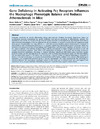Identificador persistente para citar o vincular este elemento:
https://accedacris.ulpgc.es/jspui/handle/10553/75286
| Título: | Gene Deficiency in Activating Fcγ Receptors Influences the Macrophage Phenotypic Balance and Reduces Atherosclerosis in Mice | Autores/as: | Mallavia, Beñat Oguiza, Ainhoa Lopez-Franco, Oscar Recio Cruz, Carlota Pilar Ortiz-Muñoz, Guadalupe Lazaro, Iolanda Lopez-Parra, Virginia Egido, Jesus Gomez-Guerrero, Carmen |
Coordinadores/as, Directores/as o Editores/as: | Lutgens, Esther | Clasificación UNESCO: | 3207 Patología | Fecha de publicación: | 2013 | Proyectos: | SAF2009-11794 SAF2012-38830 FIS PI10/00072 RECAVA RD12/0042/0038 |
Publicación seriada: | PLoS ONE | Resumen: | Immunity contributes to arterial inflammation during atherosclerosis. Oxidized low-density lipoproteins induce an autoimmune response characterized by specific antibodies and immune complexes in atherosclerotic patients. We hypothesize that specific Fcγ receptors for IgG constant region participate in atherogenesis by regulating the inflammatory state of lesional macrophages. In vivo we examined the role of activating Fcγ receptors in atherosclerosis progression using bone marrow transplantation from mice deficient in γ-chain (the common signaling subunit of activating Fcγ receptors) to hyperlipidemic mice. Hematopoietic deficiency of Fcγ receptors significantly reduced atherosclerotic lesion size, which was associated with decreased number of macrophages and T lymphocytes, and increased T regulatory cell function. Lesions of Fcγ receptor deficient mice exhibited increased plaque stability, as evidenced by higher collagen and smooth muscle cell content and decreased apoptosis. These effects were independent of changes in serum lipids and antibody response to oxidized low-density lipoproteins. Activating Fcγ receptor deficiency reduced pro-inflammatory gene expression, nuclear factor-κB activity, and M1 macrophages at the lesion site, while increasing anti-inflammatory genes and M2 macrophages. The decreased inflammation in the lesions was mirrored by a reduced number of classical inflammatory monocytes in blood. In vitro, lack of activating Fcγ receptors attenuated foam cell formation, oxidative stress and pro-inflammatory gene expression, and increased M2-associated genes in murine macrophages. Our study demonstrates that activating Fcγ receptors influence the macrophage phenotypic balance in the artery wall of atherosclerotic mice and suggests that modulation of Fcγ receptor-mediated inflammatory responses could effectively suppress atherosclerosis. | URI: | https://accedacris.ulpgc.es/handle/10553/75286 | ISSN: | 1932-6203 | DOI: | 10.1371/journal.pone.0066754 | Fuente: | PLoS ONE [ISSN 1932-6203], v. 8 (6), e66754 |
| Colección: | Artículos |
Citas de WEB OF SCIENCETM
Citations
24
actualizado el 12-ene-2026
Visitas
41
actualizado el 10-ene-2026
Descargas
57
actualizado el 10-ene-2026
Google ScholarTM
Verifica
Altmetric
Comparte
Exporta metadatos
Los elementos en ULPGC accedaCRIS están protegidos por derechos de autor con todos los derechos reservados, a menos que se indique lo contrario.
